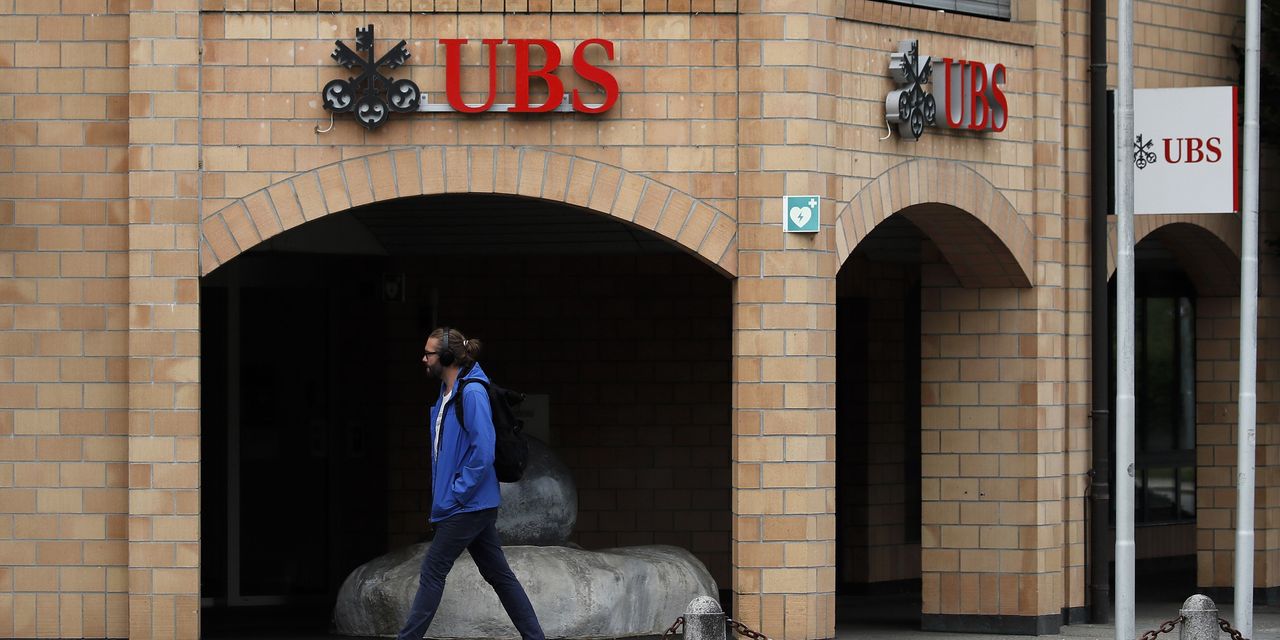

UBS is arguably Europe’s strongest big bank these days. So why are investors still wary?
The Swiss lender reported robust third-quarter numbers on Tuesday, with the highest quarterly net profit and lowest cost-to-income ratio in more than a decade. It significantly beat its own targets and posted a 17.2% return on tangible equity and 14.9% core capital ratio.
Recent results have been good from UBS, which combines a full-service bank in Switzerland with a global wealth manager and more limited investment bank and asset management operations. Money is flowing in and revenues and profit are growing. Digital technology has improved services, increased cross selling and reduced costs. Unlike rival
it hasn’t been much affected by recent financial scandals.
Despite this consistent delivery, UBS shares trade just slightly above tangible book value—below both its historical average and U.S. banking giants. That gap is a bit of a mystery.
Relative to UBS’s own average, part of the discount could be attributed to lower profitability. Regulation has tightened over the years, capital requirements have increased and there has been some erosion of Switzerland’s once-sacrosanct banking secrecy—although Swiss banks are still a relatively safe harbor in today’s world of increasing taxes and scrutiny.
The discount to U.S. rivals is much bigger, and harder to explain. UBS was more highly valued than
and even JPMorgan for most of 2010 to 2016. However, it has trailed the pair since and hasn’t bounced back to anything near the same degree since the Covid-19 crisis.
Morgan Stanley, in particular, could be considered a close peer to UBS. They offer a comparable range of services at scale. The U.S. company does have slightly better performance on a number of metrics, including cost efficiency and returns on tangible equity, but the marginal operational differences seem at odds with the massive valuation gap.
One difference is that UBS is saddled with negative interest rates in its home territory in a way U.S. banks aren’t. However, it now charges for deposits over 250,000 Swiss francs, equivalent to about $272,000, and does a lot of its business outside Europe. There is also a legal case in France that could cost it €4.5 billion, or $5.2 billion, but it has sufficient buffers and every bank has some legacy issues.
UBS seems well placed for the future. It is well established in the two prime wealth-management markets of the U.S. and fast-growing Asia. It has credibility with the emerging sustainable investing theme. Its new chief executive is promising to use IT to further extend its reach and increase efficiency. At some point, strong results may translate into a stronger valuation.
Write to Rochelle Toplensky at rochelle.toplensky@wsj.com
Copyright ©2021 Dow Jones & Company, Inc. All Rights Reserved. 87990cbe856818d5eddac44c7b1cdeb8
Appeared in the October 27, 2021, print edition as ‘UBS Stock Is a Bargain Compared With Its U.S. Peers.’
24World Media does not take any responsibility of the information you see on this page. The content this page contains is from independent third-party content provider. If you have any concerns regarding the content, please free to write us here: contact@24worldmedia.com

Common Mistakes When Using Athletic Field Tarps

High-Performance Diesel Truck Upgrades You Should Consider

Warehouse Optimization Tips To Improve Performance

Fire Hazards in Daily Life: The Most Common Ignition Sources

Yellowstone’s Wolves: A Debate Over Their Role in the Park’s Ecosystem

Earth Day 2024: A Look at 3 Places Adapting Quickly to Fight Climate Change

Millions of Girls in Africa Will Miss HPV Shots After Merck Production Problem

This Lava Tube in Saudi Arabia Has Been a Human Refuge for 7,000 Years

Four Wild Ways to Save the Koala (That Just Might Work)

National Academy Asks Court to Strip Sackler Name From Endowment

Ways Industrial Copper Helps Energy Production

The Ins and Out of Industrial Conveyor Belts